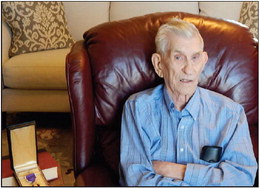Local WWII veteran tells his story

Local WWII veteran tells his story
Beck shares experience for Senator Boozman’s history project
news@theeveningtimes.com
Frederick Beck fought his way across Germany and into Central Europe in the waning days of World War II, but it was a bullet fired accidentally after the war was over by a sergeant in Austria which came within 1/16th of an inch from taking his life, not the Germans.
“He was playing with a pistol,” Beck said. “He shouldn’t have had it because we were told not to pick that stuff up. He was playing with it and shot me in the leg. It still hurts. I found out later that from the doctor that if that bullet had been 1/16th of an inch closer, I would have laid there and bled to death right there. Every time I see a ruler I still look at that. I came within 1/16th of in from dying.”
Beck, who is now 92 and lives in Marion, was interviewed this week by staff from U.S. Senator John Boozman’s office for the National Veteran’s History Project.
His recollections of his time in uniform during World War II will be preserved along with those of over 100,000 veterans who have described their service in audio and video recordings that are now part of the collection.
The Veterans History Project is an initiative by the Library of Congress that aims to preserve and make accessible the personal accounts of American war veterans for future generations to hear and better understand the realities of war.
Over 80,000 accounts from veterans of World War 1, World War II, the Korean War , Vietnam War, Persian Gulf War, and Operations Iraqi and Enduring Freedom have been collected and archived, along with original correspondence, photographs, and diaries.
Beck grew up on a farm outside of Morrilton, Arkansas and was drafted into the Army when he was 19.
He served in the 65th Infantry and later was rolled over into the 9th Infantry Division.
The 65th Infantry — nicknamed the “Battle Axe” — landed in Le Havre, France in January 1945 and fought its way to the Rhine River and across into Germany where they ran in to heavy German resistance and counterattacks. They ended the war occupying Linz, Austria in May 1945.
Beck remembers disembarking in France on the same beaches that were used during the D-Day invasion.
“They anchored our ship out in the English Channel and we crawled into landing boats and hit the beach where the original ones first went in,” Beck said. “I forget the name. Was it Omaha Beach maybe?”
The 9th Infantry Division was already a veteran division having fought in Africa, Sicily and Normandy. They latter battled their way through Belgium and was among the first units to set foot on German soil. They saw combat in the Hurtgen Forest and the Ardennes, then fought their way across the Rhineland and into Central Europe.
“I was one of the later ones who went in,” Beck said. “The war was winding down. By the time we got in, the Germans were already backing up and heading home to Germany.”
Beck remembers the Germans put up a stubborn resistance.
“I had a couple of tight scrapes when I was over there,” Beck recalled. “A couple guys who went out ahead of us got shelled (by German tanks) and it killed them both. Then they dropped the shells on us.
They were trying to hold us back. A shell tore into the guy next to me and took his foot off — or I thought it took his foot off. It might have cut his boot off. But I think it did.”
Beck was wounded in one engagement and remembers getting frostbite in his toes.
“There was snow on the ground and I got my feet frozen,” Beck said. “It took them a good long time to get thawed out. There was no stopping back then. You were there until the job was done. They didn’t send you home because you got a little hurt.”
Another time he remembered cooking eggs on a piece of metal over a campfire which proved to be popular with his cold and hungry comrades.
“We made omelets,” Beck recalled. “These other guys broke up a bunch of stuff and stirred them up a little bit. But nobody would eat them. They had brown spots in them. So I showed them how to cook some eggs and made omelets.
Everybody ate them and came back for seconds.
They wouldn’t eat the other ones. I couldn’t blame them. I wouldn’t eat them either.”
Beck ended the war having earned two Purple Heart medals.
“They really don’t mean a whole lot to me,” Beck said. “You can’t eat them.”
Beck’s daughter, Katherine Burns, arranged to have her father’s memories included in the project. It took nearly two years before they got around to interview him.
Arkansas is home to more than 250,000 veterans, however, only 1,000 stories from Arkansas veterans are part of the collection.
Retired Col. Anita Deason, Boozman’s military and veterans affairs liaison, travels the state conducting interviews with Arkansas veterans and hosting training workshops to teach volunteers how to capture the memories of the veterans.
“If there is anybody interested in us doing a workshop or recording their story, give us a call,” Deason
said.
By Mark Randall


Share